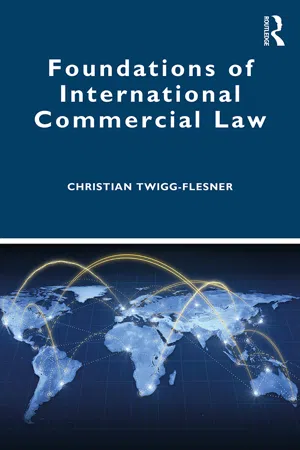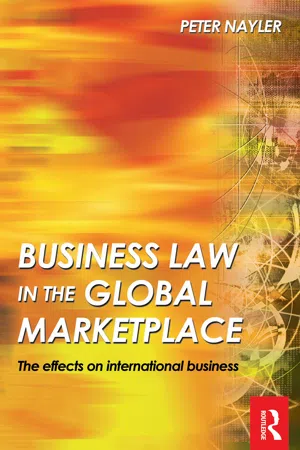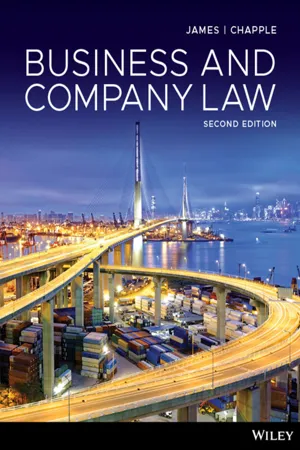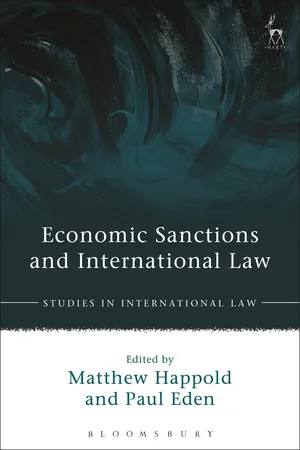Law
Commercial Law
Commercial law encompasses the legal rules and regulations that govern business and commercial transactions. It covers areas such as contracts, sales, negotiable instruments, and business organizations. Commercial law aims to provide a framework for businesses to operate within, ensuring fair and ethical practices while also protecting the rights and interests of all parties involved in commercial activities.
Written by Perlego with AI-assistance
Related key terms
1 of 5
4 Key excerpts on "Commercial Law"
- eBook - ePub
- Christian Twigg-Flesner(Author)
- 2021(Publication Date)
- Taylor & Francis(Publisher)
At the heart of Commercial Law are therefore the many different types of contracts and related transactions, and the focus of Commercial Law is primarily on contracts. In this sense, it can be distinguished from company law, which is the law concerned with business structures and organisations, and trade law, which focuses on the way in which States facilitate or restrict trade. Commercial Law is about more than just contracts and the various legal rules and principles which directly apply to contracts. Most commercial contracts are entered into in a context which includes regulatory regimes of different kinds, and such regimes can have an influence on the way in which contracts are made and performed. Commercial Law therefore includes all the different types of legal principles and legal rules which shape the rights of the parties to a commercial transaction. One of the UK’s most eminent legal scholars described Commercial Law as “the totality of the law’s response to the needs and practices of the mercantile community”. 2 1 This is discussed in more detail in Chapter 2. Commercial Law can take a variety of forms. A helpful typology is provided by Block-Lieb, who distinguishes between commercial common law, commercial code and commercial regulation. 3 In her typology, commercial common law arises from the contracts between commercial parties which result in litigation and at which point a court determines the relevant law based on contracting practices and judicial precedents. A commercial code is a legislative recasting of past contracting practices and existing judgments, as well as provisions on emerging issues. Both of these interact with contracts; in particular, commercial code rules can usually be displaced by the terms of the contract. In contrast, commercial regulation concerns binding obligations for commercial parties which are mandatory and therefore cannot be contracted out of, and which can be enforced by public bodies as well as private parties - eBook - ePub
- Peter Nayler(Author)
- 2006(Publication Date)
- Routledge(Publisher)
Employment law is that part of the law which relates to the employment of labour and matters associated with it. In most developed industrial societies this is an area of the law which is constantly growing as it seeks to balance the legitimate commercial interests of the employer with the rights and entitlements of the employee. Within the scope of employment law are found rules relating to the formation, content and termination of the employment contract, unlawful discrimination, maternity rights, health and safety, trade unions and their activities, and so on.The term Commercial Law can have a different connotation depending on whether it is being viewed from a common law or civil law perspective. In the case of English law, for example, the term has no precise meaning, often being merely descriptive of those areas of law relating to the supply of goods and services. Indeed, if one examined the contents page of several textbooks bearing the title ‘Commercial Law’, there would be no guarantee that exactly the same subjects would be included. Typically, however, matters such as contracts of sale, agency, negotiable instruments, and contracts of carriage would come under the heading of Commercial Law. Again, as in many areas of English law, the specific rules relating to the above subjects arise not from a single source but from a variety of sources, including precedent and statute.In civil law jurisdictions, on the other hand, the term ‘Commercial Law’ refers to that separate and distinct branch of the law containing special rules applying to merchants and their commercial activities. Very often this body of rules is contained in a commercial code such as the French Code de Commerce or the German Handelsgesetzbuch (HGB). The content of Commercial Law will necessarily depend on the particular jurisdiction under consideration, but by way of illustration a brief foray into the HGB might be helpful.The HGB consists of five books. Among the matters dealt with in Book One is the concept and status of the merchant (Kaufmann). Although certain aspects of a merchant’s activities will come within the remit of the civil code (BGB), he or she will also be subject to the special regime contained in the HGB. At the outset, therefore, it is essential to know who has the status of a merchant. Paragraph 1 defines a merchant as a person who carries on a commercial enterprise. A ‘person’ can be an individual, a commercial partnership or a company. Paragraph 2 contains a list of nine activities which constitute a commercial enterprise. These are: buying and selling goods and securities, including the manufacture of goods; processing goods received from third parties (for example, carrying on the business of a dry-cleaner); insurance; banking; the carriage of goods or persons by sea, inland waterway or land; forwarding and warehousing; commercial agency and brokerage; bookselling and publishing; printing. Any person conducting any of the above activities is, by operation of law, deemed to be a merchant. - eBook - PDF
- Nickolas James, Ellie (Larelle) Chapple, Alex Wong, Richard Baumfield, Richard Copp, Robert Cunningham, Akshaya Kamalnath, Katherine Watson, Paul Harpur(Authors)
- 2019(Publication Date)
- Wiley(Publisher)
If you want to buy a house it is real property law (as well as contract law) that will regulate the rights and obligations of the parties to the transaction. • Commercial Law regulates various commercial matters including agency, franchises, insurance and bankruptcy. • Employment law regulates the relationships between employers and employees. If you want to negotiate the pay and conditions of work with your employees, the negotiations will be regulated by employment law. • Company law and partnership law regulate the establishment, management and dissolution of corpora- tions and partnerships. FIGURE 1.2 Categories of law Public law Constitutional law Administrative law Criminal law Taxation law Tort law Contract law Competition and consumer law Property law Private law Law Commercial Law Employment law Company and partnership law Pdf_Folio:12 12 PART 1 Business law ACTIVITY — APPLY Which category or categories of the law would be the most relevant in each of the following situations? 1. The Federal Parliament passes a new piece of legislation. The Queensland government claims that the Federal Parliament does not have the authority to pass such a law. 2. A journalist has written a news story that contains defamatory allegations about you that are not true. 3. The Department of Transport has refused to grant you a driver’s licence. You believe that the decision maker was biased. 4. You have been charged with shoplifting. 5. One of your competitors is using a logo that looks substantially similar to your logo. 6. In breach of a written agreement, one of your suppliers has failed to deliver important supplies to your business on the agreed date. Criminal and civil law Another way in which various laws can be categorised is according to whether they are criminal law or civil law. Just as the distinction between public and private law is usually applied to substantive law, the distinction between criminal and civil law is usually applied to procedural law. - eBook - ePub
- Matthew Happold, Paul Eden, Matthew Happold, Paul Eden(Authors)
- 2016(Publication Date)
- Hart Publishing(Publisher)
2The distinction drawn by the authors of Chitty between the international law and domestic public or constitutional law that creates the legal environment, and the private law that operates within it, provides a useful framework for understanding the interrelationship between sanctions (and armed conflict) and Commercial Law today.The first volume of A Treatise on the Laws of Commerce and Manufactures and the Contracts Relating thereto is devoted to an explanation of the ‘Commercial Law of nations’, the treatment of alien merchants and how the ‘commerce and contracts’ of belligerents and neutrals might be legally affected by war. The ‘Commercial Law of nations’ to which Sir Joseph was referring was a body of primarily maritime law which traced its origins back to a set of laws compiled by the island of Rhodes in around 900 BC, and included the Consolato del Mare (thirteenth century), the Laws of Oleron (circa twelfth century), the Black Book of Admiralty, ordinances of the merchants and masters of Wisburg (thirteenth century), laws of the Hanseatic League (the late-sixteenth century) and the ordinance of marine of Louis XIV published in 1681 codifying maritime practices.3 The subjects covered included reprisals, lawfulness of capture of enemy vessels, sharing prize4 and the effect of restraint of princes on a voyage,5 a mixture of what we might now categorise as rules of private Commercial Law, national public law and international law, but which were then conceived of as simply the ‘law of nations’. Law reflected the prevalence of war. Indeed, the first ‘multilateral treaty’, the Pact of Paris of 1856, addressed the rules on the capture of enemy goods in neutral vessels and blockade.6 Capture and treatment of enemy and neutral vessels and cargo and blockade received more extended treatment in the 1899 and 1907 Hague Peace Conferences,7 and prize law received domestic legislative treatment in English law in the 1864 Naval Prize Act.8 The continued relevance of the rules of naval warfare and neutrality as part of the jus in bello (notwithstanding the initial doubt after the ‘outlawing’ of war in the UN Charter) was affirmed in the 1994 San Remo Manual on the International Law Applicable at Sea9 and, more recently, the various official enquiries into the 2010 flotilla incident in the Israeli blockade of Gaza.10 English law still contains rules on prize11
Index pages curate the most relevant extracts from our library of academic textbooks. They’ve been created using an in-house natural language model (NLM), each adding context and meaning to key research topics.



